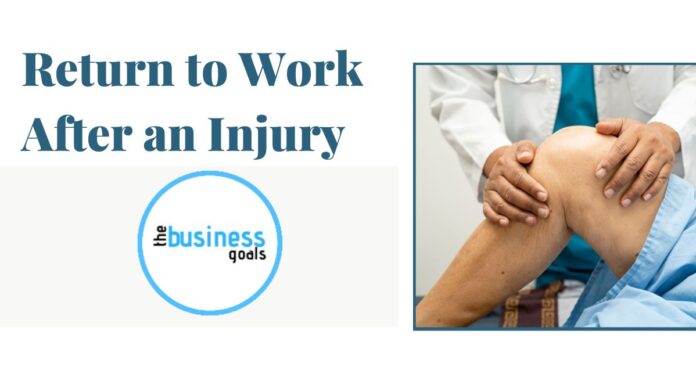Returning to work after an injury or disability can be a significant milestone in recovery. However, deciding when to return to work is crucial and requires careful consideration of various factors. Balancing physical and mental health, job demands, and available support are essential in making an informed choice. This article provides guidance on deciding when to return to work after an injury or disability.
How and When Return to Work After an Injury or Disability
Consult Your Healthcare Team
Your healthcare professionals, including doctors, therapists, and rehabilitation specialists, are vital in guiding your return to work. They comprehensively understand your condition, treatment progress, and physical capabilities. Regularly consult with them to assess your readiness to resume work, considering their recommendations and expert advice.
What Is One Way For An Entrepreneur To Decrease Risk?
Assess Your Physical and Mental Health
Evaluate your physical and mental well-being objectively before returning to work. Consider the nature of your injury or disability and how it may impact your job duties. Are you able to perform essential tasks without compromising your recovery? Assess your pain levels, mobility, stamina, and potential limitations that might affect your work performance. Additionally, consider your mental health and emotional well-being. Returning to work can add stress, so ensure you have adequate coping mechanisms.
Gradual Return or Modified Duties
If your injury or disability warrants it, explore the possibility of gradually returning to work or modified duties. This approach lets you ease back into your job responsibilities while adapting to physical limitations. Discuss with your employer the potential for a phased return, reduced hours, flexible schedules, or modified tasks to ensure a smoother transition.
Workplace Accommodations and Support
Identify the accommodations and support you may need in the workplace to facilitate your successful return. Communicate openly with your employer or human resources department to discuss reasonable adjustments such as ergonomic equipment, assistive technology, or workplace modifications. Collaboration is vital to creating an inclusive and supportive environment catering to your needs.
Financial Considerations
Evaluate the financial implications of returning to work. Consider factors such as sick leave, disability benefits, workers’ compensation, or insurance coverage. Understanding the financial support available to you can help alleviate concerns and ensure a smoother transition.
Negotiating Fair Accommodations under the ADA
When negotiating fair accommodations under the ADA, educate yourself about your rights and engage in constructive dialogue with your employer. Assess job demands, initiate a conversation, offer accommodation suggestions, and engage in an interactive process to find reasonable solutions. Document all communication, seek legal advice if needed, and strive for open communication, collaboration, and understanding to ensure a successful return to work with appropriate accommodations.
Personal Readiness
Assess your personal readiness to return to work by reflecting on your motivation, confidence, and overall satisfaction with the idea. Consider factors such as job satisfaction, the sense of purpose and fulfillment work provides, and its impact on your overall quality of life. Balancing these factors with your physical and mental well-being is essential for a successful transition.
Seek Emotional Support
Returning to work after an injury or disability can bring forth a range of emotions. It is crucial to seek emotional support from loved ones, support groups, or counseling services. Sharing your concerns and experiences with others who have faced similar situations can provide valuable insights and encouragement throughout your journey.
Deciding when to go back to work after an injury or disability requires careful consideration of various factors. You can make an informed decision by consulting your healthcare team, assessing your physical and mental health, exploring workplace accommodations, and evaluating your personal readiness. Remember, the journey to recovery is unique for each individual, so take the time necessary to prioritize your well-being while gradually reintegrating into the workplace.


The content Team Writer is one of the writers from our team of content writers. The Business Goals blog is expanding day by day and we need more writers and brand ambassadors for promoting our media website. If you are interested contact your portfolio through the Write for Us page.



















































